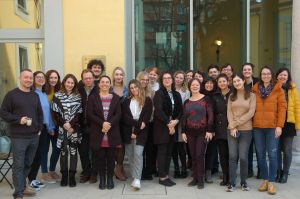Intensive Training Week in Italy January 20-24.1.2020
General aim of the week:
Students and teachers will mainly share maeaningful stories of RCC, and work on them in order to build spesific learning modules based on competences and to develop mutual understanding of diversities and similarities of working in RCC in different countries.

The second ERCCI intensive learning and teaching event took place in January 2020 at Villa di Breme Forno, an amazing 17th Century mansion recently transformed to host courses in Advanced Education of University of Milano Bicocca, Italy.
Ten teachers and researchers and twenty-five university students gathered to discuss and reflect together on the pedagogical framework of ERCCI’s MOOC and how to provide a competence-based online course. We recognized and discussed various challenges entailed by our project: developing a shared definition of empowerment and competence, composing the differences between our diverse learning approaches and research paradigms, building up rigorous and original contents which would fit the particular and unique RCC contexts despite all the differences that characterize them in each country, and creating innovative and attractive modules using a variety of e-learning tools.
Prof. Laura Formenti and the team from UNIMIB brought a theoretical and methodological contribution to the project in terms of developing a pedagogical frame for training based on reflexivity – illustrating the concepts of reflection and reflexivity, calibration, relational responsiveness by a lecture and group work. All the partners presented some examples of their learning contents, from the modules they are designing, and guided the participants through exercises, discussions, and personal critical reflection.
The facilities, as well as the climate and relationships in the group, were excellent for working together, and guaranteeing a successful experience. A part of the program involved regional and national stakeholders, which was an eye-opening experience about the Italian context, with many examples of RCC practices and ongoing projects. Not least, from care leavers’ experience. This added further knowledge to reflect about the needs for RCC training. The concrete outcome of the international working week, besides the learning outcomes for each participant, was an updated shared framework and a sketch of all the seven modules, with their interconnections and a teaching model/structure to foster a competence-based profile for professionals working in RCC.
At the end of the LLT, all the participants expressed their satisfaction and gratitude about the advancement in the development of our project, in terms of ideas, participation and coordination. This occasion was recognized as a great opportunity to learn from each other, to test our ideas and even to challenge them.
Laura Formenti and Alessandra Rigamonti
